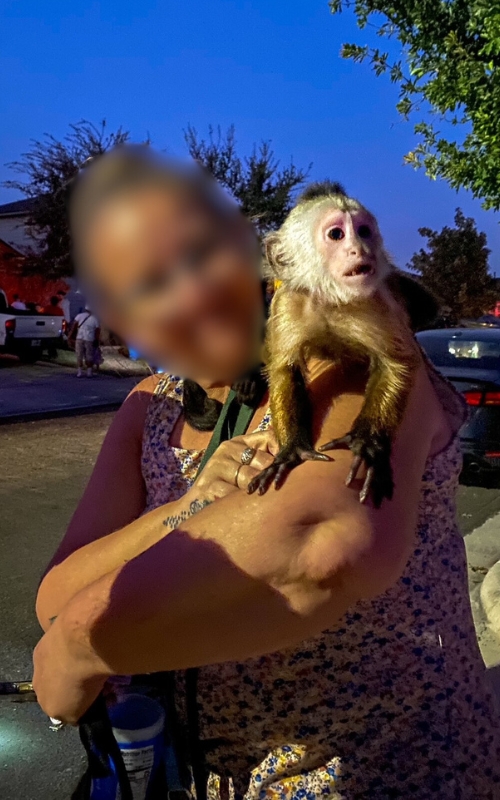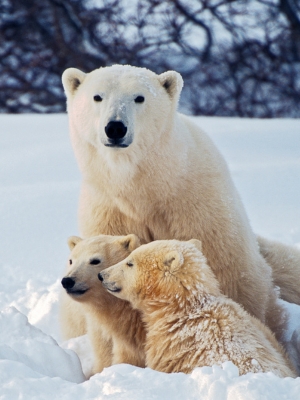Like many families, I was looking forward to Halloween this year; not least because it would be my young daughter’s very first spooky holiday. As darkness fell, we left the house dressed in our silly costumes and with candy bucket in hand. We headed to a local neighborhood renowned for going all out for Halloween and were not disappointed. Hundreds of people had flocked to the neighborhood and music, excited chatter, laughter, and shouting filled the streets. From funny to genuinely scary decorations, almost every house was adorned, and everyone was happily enjoying the Halloween celebrations.
Pet Primates Forced to Parade around in Costumes
As we approached one particularly spectacularly decorated house, I noticed a man in the crowd with what appeared to be an animal on his shoulder. Confused and worried that it was perhaps a cat, or (hopefully) a mechanical model, I took a closer look and was horrified to see that the animal was a live lemur with a plush spider attached to his back as some form of “costume.” I moved closer and was further shocked to see that the family of three all had a primate perched on their shoulders or heads.
I approached the family. A tiny capuchin monkey chittered anxiously at me, the lemur was swiveling his head around to and fro on high alert, and a marmoset sat looking around on the daughter’s head.

I told the woman that I had worked with capuchins in the past and she proudly showed me the baby, telling me that he was eight months old. His face was worryingly pale and his scared chitters and wide eyes clearly told me that he was frightened. And who could blame him; I had been very conscious of my own toddler daughter as we walked around the neighborhood, constantly checking that she was still laughing and enjoying herself, as it would be very easy for such a little person to feel overwhelmed with the crowds, lights, and noise. I cannot imagine how scary it might be for these wild animals thrust into a completely unnatural and intense environment.
Pet Primate Owners May Love their “Pets” and Not Realize the Harm They Cause
Before we were able to broach concerns about the welfare of these wild animals, the family moved on and disappeared into the crowd. It is important to understand that people who own these animals and believe they can live a happy life as pets are not cruel. They genuinely love the animals that they are unwittingly exploiting but clearly do not understand their needs or behavior. If they did, they simply wouldn’t keep them and, at the very least, would have known that at least two of the animals were experiencing extreme stress in the specific situation that they had been forced into.
How Many Animals Are Suffering Behind Closed Doors?
With three primates being paraded around just one neighborhood in central Texas, it begs the question: how many more may be suffering behind closed doors? While there are an estimated 15,000 primates kept as pets in the United States, this figure could be very conservative due to the almost complete lack of regulation and tracking of privately owned animals.
I wish that we had more time to speak to the family, to gently share our concerns, and to encourage them to contact a reputable sanctuary and explore rehoming options. But, like so many wild animals kept as pets, as their owners disappeared from view, the animals went back under the radar of oversight and regulation.
Federal Legislation Is Needed
Even if we were able to convince this one family to do the right thing, it would be just a drop in the ocean in terms of the wider trade. The cruel sale and keeping of primates as pets will not be solved by working with individual owners, but by the introduction of sweeping, systemic change. That’s why it is absolutely vital that the Captive Primate Safety Act is passed into law, not just to protect animals from harm, but also to protect unsuspecting owners from unintentionally treating their beloved animals cruelly. This bill will ban the keeping of primates as pets across the country. While the bill is unlikely to pass in what remains of this Congress, we will be working hard to see it pass into law in the upcoming political cycle.
Join our email list so that you can act when the time comes to take action!
Keep Wildlife in the Wild,
Liz
Dear Reader,
We are a nonprofit committed to wildlife conservation, welfare, and rescue. Making resources free and widely distributed, like our news items, is an important part of our mission. If you found this article helpful, enjoyable, or enlightening, please donate to help keep these resources available, and Keep Wildlife In The Wild.
Thank You,
The Born Free USA Team

 Dear Reader,
Dear Reader,